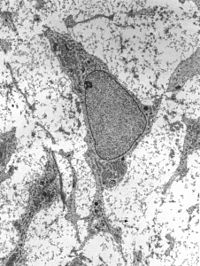
Photo from wikipedia
Emerging evidence now indicates that mitochondria are central regulators of neural stem cell (NSC) fate decisions and are crucial for both neurodevelopment and adult neurogenesis, which in turn contribute to… Click to show full abstract
Emerging evidence now indicates that mitochondria are central regulators of neural stem cell (NSC) fate decisions and are crucial for both neurodevelopment and adult neurogenesis, which in turn contribute to cognitive processes in the mature brain. Inherited mutations and accumulated damage to mitochondria over the course of ageing serve as key factors underlying cognitive defects in neurodevelopmental disorders and neurodegenerative diseases, respectively. In this Review, we explore the recent findings that implicate mitochondria as crucial regulators of NSC function and cognition. In this respect, mitochondria may serve as targets for stem-cell-based therapies and interventions for cognitive defects.Neural stem and progenitor cells can be regulated through mitochondrial signalling mechanisms and this has major implications in physiological and pathological conditions. In this Review, Khacho and colleagues discuss how mitochondria can serve as signalling organelles that modify the fate of stem cells in the brain.
Journal Title: Nature Reviews Neuroscience
Year Published: 2018
Link to full text (if available)
Share on Social Media: Sign Up to like & get
recommendations!